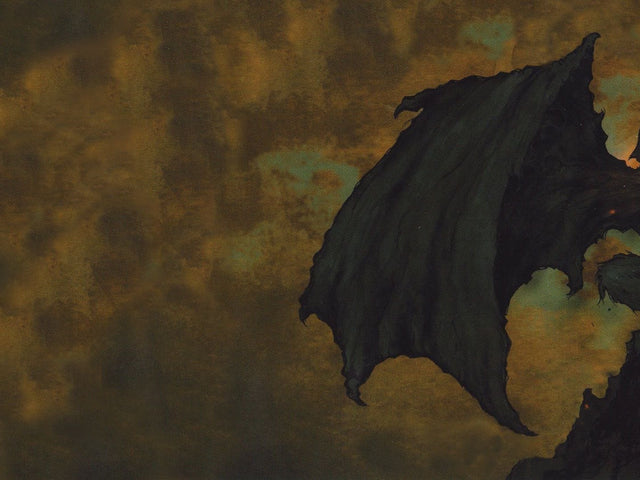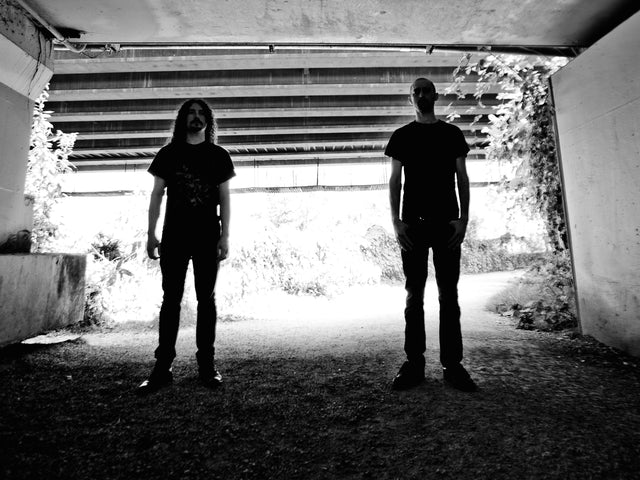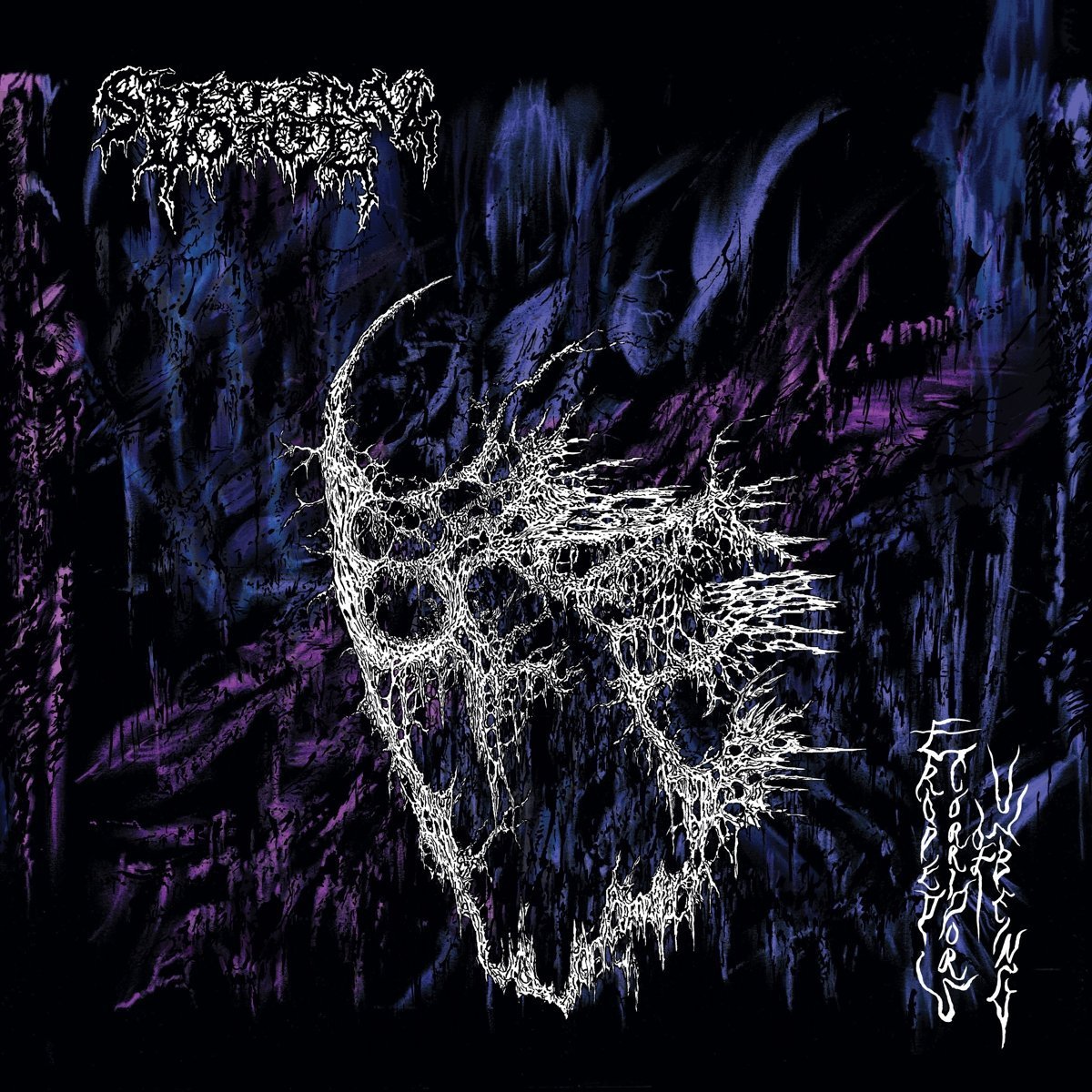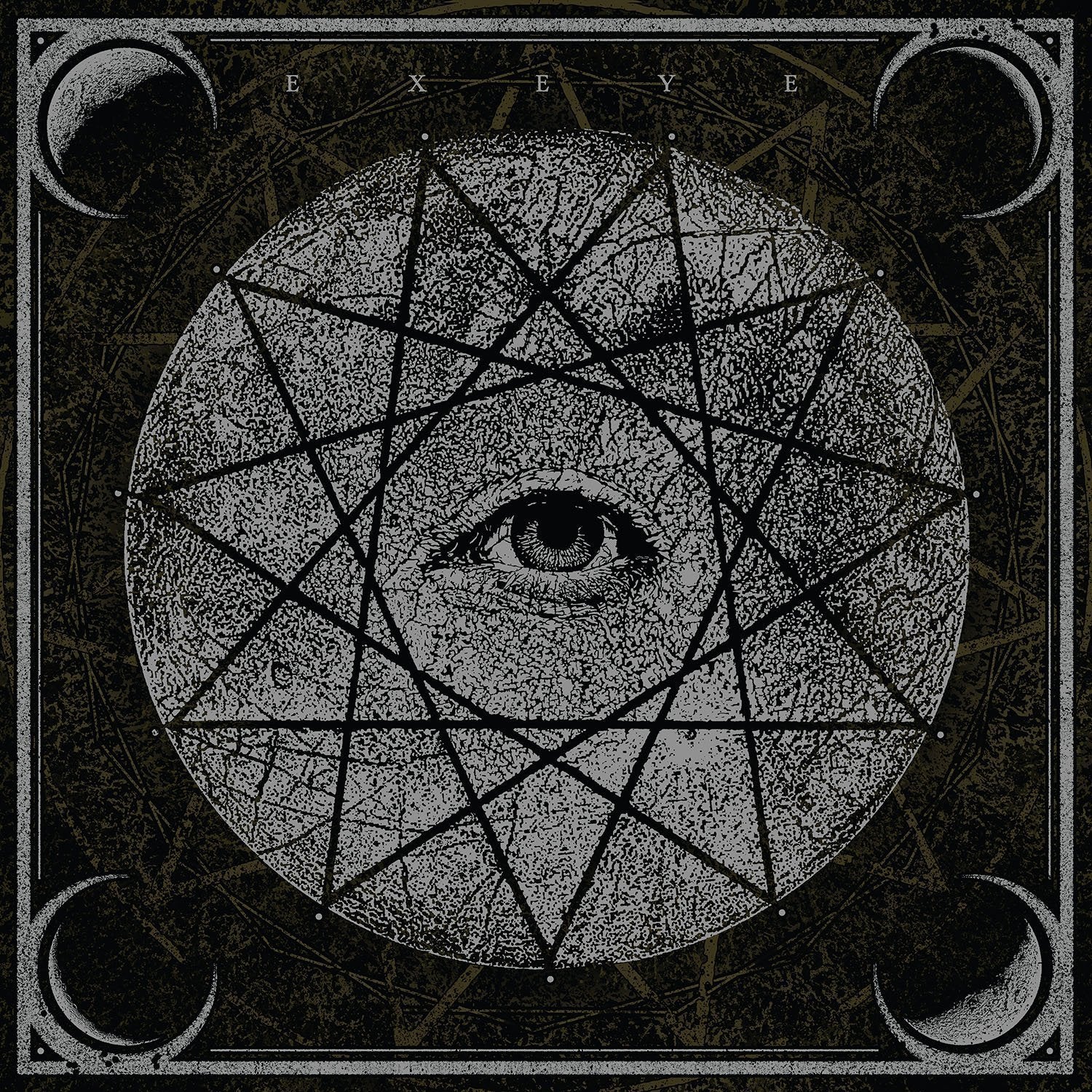Deaf Forever ist unsere monatliche Metal-Kolumne. Dies sind die 20 besten Metal-Alben von 2017.
Oakland’s philosophical death freaks Acephalix made a much needed comeback with Decreation. Even though they went off into various other during their five-year break, like Vastum, Lawless, and Necrot, this album feels like they never took a hiatus in the first place. Nobody quite combines Swedish buzzsaw guitar with American muscle quite like they do. They’ve also returned to their d-beat origins a bit, as “Upon the Altar” rips immediately with a Discharge drum assault, but they still remain deep in the death metal catacombs. And while they take inspiration from Georges Batallie (where their name originates) and Simone Weil (whose idea of “decreation” is where the album title comes from), when they knuckle-drag, they go full caveman, as they do with the Ciandie-worshipping “Excremental Offerings.” Death metal was in excellent shape in 2017 (and there’s more to come on this list), and Acephalix were ahead of the curve on this bumper crop and are still ahead for their recognition that it’s about both mind and body. And sick riffs.
In the Cosmo Lee era of Invisible Oranges, there was one exception to “don’t read the comments”: a Greek fellow named Helm, whose comments were almost as involved as the articles themselves. Whether you agreed or disagreed with him, there was no doubt he took metal extremely seriously, and I respect him for that, because game recognize game. Helm’s now the main composer for Greek duo Locust Leaves, a progressive metal band that actually seeks to progress. There’s plenty of old school on their debut record — vocalist Nick K. would be shoo-in for an ‘80s power metal band, and the “progressive” here is more Fates Warning than Dream Theater — but it’s driven by purposeful complexity. It takes all sorts of turns, it’s not exactly linear, and yet it’s not complicated for the sake of being complicated. Helm summed it up best in an interview for Bandcamp: “Every aesthetic decision that we have made in our record was informed not by what heavy metal is, but what we could imagine it to be. We do not think the record is that ‘out there,’ avant garde, experimental or weird. It is just self-analytical, personal and open to its own failures. For us, this is how every heavy metal record should be: nothing like ours, yet still aware of its form-as-such.” Fuck yeah, mate.
Denver’s Spectral Voice are no strangers to space. After all, three fourths of them are in cosmic warriors and lords of the longsleeve Blood Incantation. Spectral Voice is a doomier version of that band, treating space as a celestial coffin rather than a cruiser. Drummer Eli Wendler, the one who isn’t in Blood Incantation, also handles vocals, and his deeper voice is more suited for the floating uncertainty the band conjures. As with Blood Incantation, there’s plenty of Trey Azagthoth weirdness, but instead of oozing forth, it’s suspended, shifting more slowly like death metal slime. Solos ring more than they squeal, a signal that you’ll meet a Frank Poole demise, uncertain if you’ll get your own 3001. None of these worlds are yours — attempt no landing there.
Necro production and fuzzy screeches? Bitchin’ riffs and hooks? Rebel Wizard proves you don’t have to choose between both with his new EP The Warning of One. Black metal that forces itself to be fun usually isn’t good enough to even be campy — there’s a reason why even though it had a reputation of being utterly humorless, it’s better off that way. Warning is a rare exception and it’s such a joy to listen to, throwing a biker vest into Blood Fire Death-era Bathory and sending it speeding along into star-draped plains. In its compact size it feels endless and engrossing, the leads the stuff of vivid shredder dreams. Like, try not pumping your fists to the glorious break in “One I See.” Your inner hesher will always win.
Last year, it was Psalm Zero with “this dude who played bass in the Dirty Projectors made one of the year’s best records” with Psalm Zero’s Stranger to Violence. This year, it’s “that guy who plays sax for Arcade Fire? He has a killer jazz-metal band!” Colin Stetson’s Ex Eye strikes at the shared cerebral overload that the most intense forms of jazz and the most extreme of metal summon on their debut record. When I spoke with Stetson back in the summer, he described one of the group’s main purposes as “breaking open…perceptions of the passage of time,” and it’s true: this is much more engrossing than its 37-minute run time suggests. “Anaitis Hymnal; The Arkose Disc” would be an ambient track were it not for Greg Fox’s pummel; Stetson’s sax drawls and Toby Summerfield’s washed out guitar are a depravation tank on the low. They really rip open on closer “Opposition/Perihelion; The Coil,” bulldozing the barriers between black metal, skronk, and free jazz. Everything Now? No, Ex Eye is everything, now.
A friend described Slovakia’s Malokarpatan as “black metal Stained Class.” That alone sold me, and their second album Nordkarpatenland lives up to that description. Fueled by a hunter spirit, the riffs hunger for blood, hunger for a pulse to hear their cries. You won’t just hear old Priest becoming ghostly, you’ll also hears the gallows from Maiden melodies in the distance, the sands of time running low and yet somehow never depleting. You’ll hear Melissa being burned at the stake, her light spreading outward. Even through moments of sadness, Nordkarpatenland sounds like victory, and that’s not just because of the battle horns that serve as interludes. Malokarpatan have taken black metal’s mystique of forests and farmer-warriors and combined it with classic metal’s own romantic air. Na zdravie!
Imagine if Midnight were a leather daddy grindcore band, and you’ve got New Jersey’s Pink Mass. All the Satanic sleaze and fun, yet queer as fuck, grind as fuck, spiked dildo as fuck. Their second record Necrosexual does not compromise on speed, filth, catchiness, or contempt for the bigoted social order. “Altar of Domination” gives us a two-way tie for best lyrics of the year with “Christ impaled on a phallus with nails” (none more vivid!) and “Racists and rapists alike/Castrated and fucked with impaling might/Misogynists gagged, whipped and strangled/On a thin line your life will now dangle.” There’s a cut called “NSBM FOAD” too, next time you just happen into Richard Spencer in an ill-fitting brown suit. And if those are too hot for TV, don’t worry: they sing about vore and autoerotic asphyxiation on here too!
I have few hard and fast rules with metal lists, but: when Blut Aus Nord puts out anything, there’s a good chance it’ll make it. With Deus Salutis Meae, mastermind Vindsval returns to the blackened-industrial hellscapes of his landmark record The Work Which Transforms God, driving them closer to their mother superior, Godflesh’s Streetcleaner. It sounds meaner, the riffs more suffocating and the drumming even more mechanical, yet it’s still contorted in Vindsval’s image. The songs rise and fall with such tumult, sounding both a continuation of the God sound and totally alienated from it, the bile flowing ultimately scarring the sound’s DNA. 2014’s Memoria Vetusta III: Saturnian Poetry had a similar approach with a more traditional second-wave black metal sound, approaching familiarity through a singular voice. Admittedly, Vindsval had some stiff competition this year, yet Deus is more proof he’s one of (black) metal’s few true idiosyncratic forces. (Still, where is that Dalek collaboration?! Heads ain’t ready.)
If this was a list of the best album covers of the year, this would be #1 easily. I’d paint it on a van and drive around Austin all day blasting Morbid Angel cassettes. Alas, we are stuck in reality, though this record gives a view into unreality. Death metal should embrace the absurd, and what better way than adding Roman ceremony horns and David Lynch sax into the mix? Speaking of that sax, the first half “Non-Existence’s Warmth” is what hell’s lounge band would sound like, lowering you slowly into the flame that’ll roast you succulent. Tchornobog takes the death-doom sound beyond slow death metal or goth with growls, torturing it into a series of howls and unpredictable chaos. This record is such a trip that you’ll need to watch Kool Keith talking about his fridge at least twice to get to normality. Luckily, seltzer water is back in style.

Being a critic is weird — the further down I go into atonal death jazz and microtonal black metal and queer Satanic grind (see #14), the more I return the classics I grew up on — old Metallica, Sabbath, Pantera, Slayer, metal metal. Gatecreeper guitarist Nate Garrett also went back to his roots for making his solo project Spirit Adrift’s second album, and in the process, he came a long way as a songwriter. He took the longform doom from his debut and injected with a whole lot Dio-era Sabbath, handlebar-moustache Hetfield, and Pentagram boogie (“Spectral Savior” does have that “Change of Heart” riff, not that I’m complaining). Not only is Curse more varied, it’s more aspirational. “Heavy metal rules” is both the subtext and the text — he may not say it, but his riffs sure do.
Austin did not invent smoked brisket, we just made it better. Likewise, Austin’s Chris Ulsh is by far not the first to fuse punk and metal, but few do it as well as he does. His group Impalers is just one part of his impressive resume that includes Power Trip and Mammoth Grinder, and Cellar Dweller is a heat stroke in a fallout shelter. It’s blown out yet incredibly catchy — Ulsh always has an ear for those sweet spot riffs, and here he’s taken that into a punkier context. Their “Electric Avenue” isn’t kitstch (and no relation), it’s all killer and no concept of filler whatsoever. I’ve heard this referred to as “stadium crust” derisively, because punks are dumb, but Dweller merges huge sounds and small spaces so well, it almost makes sense. And if you can’t envision a mass of bodies moving during the sweeping “Nuclear Cabaret,” I pity your imagination. (By the way, this won’t be the last you see of him — or Texas — on here.)
As I mentioned earlier, 2017 was shitty for a lot of things, but death metal was not one of them. Plenty of bands old and new released great records, championing the idea that growling about death and destruction…might be one of the few ways to really make sense of things now? If you’ve listened to death metal for a while, though, you probably knew that already. The king of them all this year was Immolation’s Atonement. They already had a head start by being above most of their peers, on a path of re-embracing complexity and non-linear structures since 2010’s Majesty and Decay. As always, guitarist Robert Vigna is the star of the band, expanding on his choppy, almost avant style. Every squeal and tapping passage feels jagged, less driven by technicality or “the right notes” than his own free will. His solos zig and zag and don’t make much sense on their own, but in the music he’s simply fluid and natural. Immolation at their heart are old metal dudes, so they don’t go totally in the weeds with Vigna’s explorations. Still, banishing the very idea of streamlining their sound has done wonders for them.
Are you embarrassed by modern day Ministry? Do you think Al Jourgensen has devolved into a hashtag resistance bot with too many piercings and too few musical ideas? At the risk of glorifying drug use, do you yearn for the days where he bilked Sire out of 1.5 million to finish Psalm 69? Uniform’s Wake in Fright is the record you need. Guitarist Ben Greenberg proves to be a thrash archivist, from the crossover-meets-Big Black of “Tabloid” to the cranked Slayer on “Bootlicker.” He beats you over the head with a few select riffs rather than throwing a Dark Angel assortment at you, a form of minimalism that’s less academic that ass-searing. Vocalist Michael Brendan isn’t fooling around either, launching himself whether you’re prepared or not. Uniform hasn’t lost the industrial plot either — “Habit” lurches creepily, and “The Lost” is a Cold Cave track gone horribly wrong. And while I’m stoked one of their next records will feature Greg Fox on drums, I hope Greenberg keeps the drum machine around and continually pissed off. The mechanical, sometimes, becomes the natural.

Whether or not you suffered material loss this year, 2017 was defined by prolonged, never-ending grief. There’s a lot of talk (including from me) about metal tapping into our shared rage and anger, yet none of the bands came to respond to the current state — it just so happened to work out that way. Nashville’s Loss didn’t make their second record Horizonless to be part of a moment, but few records go so well with mourning. Their past material focused more specifically on suicide; Horizonless, not keeping with its name, looks at the broader spectrum of death and how it’s worshipped. As such, their sound, based in agonizing, almost liturgical funeral doom, takes on a new sense of beauty. There are moments of brightness squelching through the dark, snuffed out in heartbreaking glory. I’ve jammed few songs more than “All Grows on Tears,” where vocalist and guitarist Mike Meacham sings about his grander purpose becoming one with the dirt, envisioning his death to make the Earth right. There’s much longing for his ultimate purpose, and that longing is quite transmutable.

Sannhet in town? Do not miss them. I saw the Brooklyn trio in Austin back in 2014 for Show No Mercy’s SXSW showcase, and few acts metal or otherwise have left such an impression on me. They took the surges and valleys of post-metal and made them much more immediate, making their beauty downright intimidating. So Numb is the record where they finally match their live game — there’s less metal and overt volume on here, but they’re tighter and more dynamic than ever. It’s more about finesse than mastery, they know how to use space without being cloying. Guitarist John Refano experiments with lighter, freer playing, more ambient than his previously black metal-rooted work, leaving drummer Christopher Todd in control. And does he know how to work a band — even in the lighter moments, Numb is brimming with urgency. The future of metal is in post-genre records, where the spirit is alive whether it conforms to one particular sound or not. Numb is one of those albums.

“It’s not the artifact, it’s the art,” says Eugene Robinson, vocalist for Oxbow, on “Letter of Note” from their first album in a decade, Thin Black Duke. That sentiment might not exactly jive with this site, but are you gonna challenge Robinson about it? He’s smarter than us, he’s better looking than us, and he’s known for choking out hecklers at shows. He’s not a guy you want to fuck with, and his band isn’t any less intimidating. Oxbow can summon stadium hooks, intimate jazz flows, noise-rock swagger, and good old fashioned tenderness. They’re flexible because Robinson’s a versatile vocalist: sweet boy croons, hysterical screams, incomprehensible barks that’ll make any death metal fan go “what the hell?!,” unbridled Nick Cave showmanship, he really can do it all. Sometimes, within the context of one song. Duke is toned down in terms of extremity compared to their other albums, not in composition. They still have moves your limbs can’t comprehend doing.

In writing year-end lists, one has to be careful to not say the same shit about a record they talked about before, and find new insight into a record they’ve listened to way too many times. And I’ll admit, I laid myself pretty bare when I wrote about Bell Witch’s Mirror Reaper. Its intimidating stature, a single 81-minute track, doesn’t keeps me from revisiting it, it’s precisely why I come back to it so often. Ride through all of the pain: the bell-like tones from Dylan Desmond’s bass, the subterranean growls of Jesse Shreibman, Erik Moggridge’s angelic, despairing voice guiding you towards the sweet light of death, and then you get sucked back to life. Near death experience? Not quite, but Reaper traverses in the world in between. It’s worth saying again that Bell Witch understand the violence of wanting to submit yourself to death, that’s how everything cuts through that sharply. Reaper advances funeral doom beyond the slow and mournful, into new depths of pure feeling, of a minimal setup becoming a whole universe. Now I ask: do you want to be stripped raw? Put it on and try to not let it, at the very least, effect you.

Austin’s Expander present themselves as gnarly pillagers from a not-so-distant, technologically oppressive future. They go by names like General Ham, Keymaster, Guzzler and Swirly, and before my editor accuses me of making these up, I’d like to point out that Endless Computer is a victory for thrash and for Texas. Most bands aren’t this good 10 years in as Expander are now. Computer reconfigures familiar thrash elements into a warp-speed, neon-lighted nightmare. Guzzler hits all the crossover riffs, Motorhead dirtiness, and Voivod sharp turns, force-feeding tons of information into you. General Ham screams out war cries out of his control, even his Tom G. Warrior “OOGHs” feel cold and distant. Expander trap you in a hellscape, one that looks like the world you’ve known, but under much different, more sinister hands. Computer is not a typical release for the kvlt Nuclear War Now! — the album art is brightly colored, the logo is readable, there’s production value (shouts out Kurt Ballou), there’s hooks, there’s a sense that Expander will go far beyond their sci-thrash niche. Seriously, if they’re not a big package tour next year, someone’s fucking up.

“I guess all bands have their gags — for some reason, I got whiskey and sadness,” Thom Wasluck said to me earlier this year about his project Planning For Burial’s reputation. There is a lot of both in his music, yet Below the House taps into a very personal pain that resonates broadly. He returned to his home of Wilkes-Barre, Pennsylvania for a union apprenticeship, and made the record there too. The themes constant in his work — drinking too much, loneliness, regret, loss of connection, and any combination thereof — came out even more while making the album at home, and it shows. He’s never been more seething than he has on “Whiskey and Wine,” taking Jesu’s heavy metalgaze tones and applying them more in a more direct anger. “Dull Knife” takes a similar course before drifting off into an ambient simmer; Wasluck doesn’t enough credit for how he wields sparse electronics, wrenching every last bit of gorgeous pain out of them. Coming home makes you think about simpler times, and “Warmth of You” is his most accessible song, taking his angst and putting it to a familiar shuffle. Loneliness unites a lot us yet it prevents us from fully commiserating, and by making a more conventionally “rock” song, he really proves that point. A hardcore-by-way-of-goth kid from the middle of Pennsylvania has a cult fanbase from isolation is a bit of a paradox, but Planning For Burial has connected with me and so many others for that very reason. He’s less alone, we’re less alone: that’s metal.

Saying you like a band but hate their fans is a pretty asinine thing to say. You connect with someone’s music — does that make you dumb by association? Most people are pretty worthless to begin with, and I’m willing to bet even King Crimson attracts a few dullards. Unfortunately, it’s hard to not feel that way about metal in general. You can’t pick who responds to your music, and Dallas’ Power Trip realized that recently when Fox News’ Greg Gutfeld praised the band and used their music on “The Five.” This wasn’t unusual: Gutfeld, with his old show “Red Eye,” brought on GWAR, Melvins’ Buzz Osborne, and ex-Cobalt singer Phil McSorely as guests, and there’s more red-meat conservatives in metal than I’d like to admit. Grow up rebelling against the state, become the state in old age. Anyhow, Power Trip unequivocally told him they do not want his support. In response to some backlash over their disapproval, Power Trip tweeted: “Paradox: how could we be snowflakes with all these hot fire riffs?”
In just that one sentence, they summed up why Nightmare Logic is not only the best metal record of the year, but also why they’re one of the most vital bands out right now: they do not subscribe to the idea that extreme music necessitates being an extreme shithead. Power Trip aren’t above it all — they’re yelling at us to take action, to care, to not settle. They recognize that “Peace be unto thee, unless you want a piece of me” (“Firing Squad,” the album’s most blistering track) and “The choice ain’t up to me, you’ve got to fight to be free” (“Waiting Around to Die,” not the Townes song but still a banger) aren’t mutually exclusive. Isn’t that was the thrash bands of yore were trying to tell us? You may be a metal badass, but you’re still a citizen of this shit Earth, may as well make it so everyone can mosh in peace. To say that Power Trip brought thrash into the 21st century would be misleading; after all, many thrash classics are still in print and still revered by kids. Still, they are making the thrash of now, making a way for us living now to reject apathy and compromise. Of course, it helps that Riley Gale is a pointed lyricist and vocalist, that Nick Stewart and Blake Ibanez pair catchy riffs and divebombs like a well-planned campaign, and drummer Chris Ulsh (told you he would be here again!) lays down the battery. It also helps that Logic isn’t a dry recording; producer Arthur Rizk adds a touch of unsettling madness, especially the distance in Gale’s voice, that only adds urgency while making it more fitting for a world gone insane. A forceful message demands equally forceful music. Choose life: choose Logic.
Andy O’Connor heads SPIN’s monthly metal column, Blast Rites, and also has bylines in Pitchfork, Vice, Decibel, Texas Monthly and Bandcamp Daily, among others. He lives in Austin, Texas.
Trete dem Club bei!
Jetzt beitreten, ab 44 $Exclusive 15% Off for Teachers, Students, Military members, Healthcare professionals & First Responders - Get Verified!























